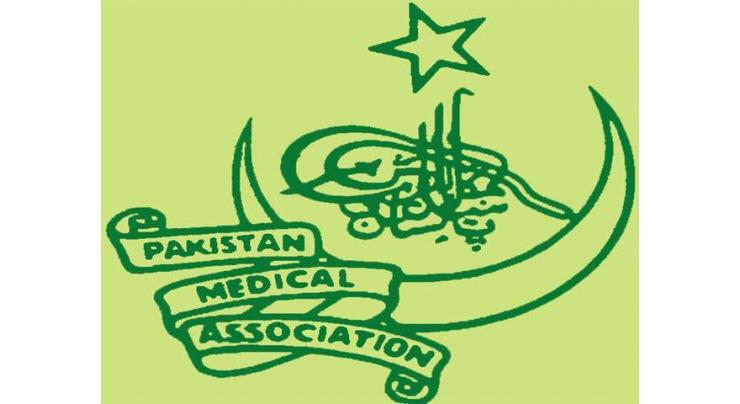
Controlling High Blood Pressure Reduces Stroke Risk By 40%
Fahad Shabbir (@FahadShabbir) Published November 07, 2016 | 07:45 PM

HYDERABAD (UrduPoint / Pakistan Point News - 07th Nov, 2016 ) : High blood pressure- with prevalence in over 70 percent patients- is the most important risk factor of stroke and risk of the brain attack incidence could be reduced by 40 percent by maintaining blood pressure alone.
Talking to APP here on Monday, eminent physician & general secretary Pakistan Medical Association (PMA) Hyderabad, Dr. Ashfaq Qureshi, has said that Stroke ranks number three as global disease burden after heart disease and cancer.
It remains the leading cause of disability in the world. He informed that due to a variety of causes, including high blood pressure, high blood fat and cholesterol levels, diabetes, smoking and hereditary factors, fatty deposits or plaques may gradually build up within the carotid artery.
Dr. Ashfaq Qureshi said that when blood clots in one of the major blood vessels near the base of the brain it hinders normal blood flows causing stroke so it was known as attack of the brain. A special ultrasound examination of the neck can help detect this problem, he added.
He said that although stroke affects more men than women, still number of women dying each year from stroke was greater than of breast cancer. Dr. Ashfaq Qureshi said that high blood pressure was the most important risk factor for stroke.
It is present in more than 70 percent patients with stroke. He said that Stroke incidence can be significantly decreased by controlling Blood Pressure. He said that stroke is a very preventable disease and reduction of blood pressure alone will reduce the risk of stroke by 40 percent or more.
The risk can be further reduced by controlling the other risk factors listed above. Studies have shown that Stroke incidence can be significantly decreased by controlling Blood Pressure and other risk factors include high cholesterol, cigarette smoking, diabetes, an abnormal heart rhythm called aerial fibrillation, and narrowing of the carotid arteries, which are major blood vessels in the neck carrying blood to the brain, Ashfaq said.
Stressing upon general awareness of symptoms of stroke Dr. Ashfaq Qureshi informed that sudden onset of weakness on one side of the body, slurring of speech, loss of vision, double vision and sudden onset of difficulty walking were the major signs of stroke.
There is now treatment available at some hospitals which must be given within three hours of stroke onset and these medications dissolve blood clots blocking blood flow to parts of the brain and if properly used they can reduce disability risks of stroke, Dr.
Ashfaq said. About the preventive measures he suggested regular check on blood pressure, blood sugar and blood cholesterol every year after the age of 40, quitting smoking and daily exercise may help prevent stroke.
He advising people who already had stroke said that these patients are at increased risk of having another attack. Measures can be introduced that will help prevent future strokes from occurring, he added.
Dr. Qureshi said that many patients with stroke become functional within six months if they get the proper care including emergency care, hospital care and rehabilitation. The goal should be rehabilitation of patient.
Dr. Ashfaq Qureshi elaborated the physical therapy or physiotherapy as treatment of disorders of the muscles, bones, or joints by means of physical agents included heat, light, water, manual and electronic massage and exercise.
Stroke, arthritis, fractures and nerve damage were common conditions treated he informed adding that the type of treatment needed was prescribed by a physician and carried out by trained physiotherapists.
He has strictly advised people to drink boiled or filtered water, eat fresh food, avoid dinning out, protect themselves from heat and cover their heads coupled with intake of plenty of juicy fruits.
Dr. Ashfaq Qureshi suggested that people should cover their heads and try to walk in the shade and bathing twice a day, once in the morning and once in the evening during hot weather. He said that people should avoid going outside in the heat unnecessarily as this could cause dehydration, heat stroke and fever and avoid smoking alcohol, physical inactivity and high fats diet.
Related Topics
Recent Stories

Currency Rate In Pakistan - Dollar, Euro, Pound, Riyal Rates On 20 April 2024

Today Gold Rate in Pakistan 20 April 2024

Tennis: ATP Barcelona Open results - 1st update

Swiatek's perfect 10 in Stuttgart as Vondrousova stuns Sabalenka

Arandu's roads closed due to flooding

Oil tanker catches fire in Islamabad’s Blue Area

Pakistan committed to ensure safety of foreign nationals: FO

Tennis: WTA Stuttgart results - 1st update

Four passengers injured as train hit an empty vehicle

Over- speeding bus crushed to death two bike riders

Turkey's Freedom Flotilla ready to set sail for Gaza

French teen dies from heart failure after knife attack near school
More Stories From Pakistan
-
PM strongly condemns attack on Customs officials in DIKhan
32 minutes ago -
Alleged outlaw sustains bullet injuries by firing of accomplices
2 hours ago -
Rain spell: Wheat crop flooded in some areas of Kot Addu
2 hours ago -
Torrential rain paralyzes life in upper Swat, Shangla
2 hours ago -
NHA restores most roads across the country after heavy rains
10 hours ago -
Three bike lifter gang held, five stolen motorbikes recovered
10 hours ago
-

Arandu's roads closed due to flooding
12 hours ago -

Oil tanker catches fire in Islamabad’s Blue Area
12 hours ago -

Pakistan committed to ensure safety of foreign nationals: FO
12 hours ago -

Four passengers injured as train hit an empty vehicle
12 hours ago -

Over- speeding bus crushed to death two bike riders
12 hours ago -

UAF celebrates Int'l Chinese Language Day
12 hours ago





